Washington Business Journal: The Journal of Record for the Growth Machine
The #1 for-profit business in the region is real estate development, either building office space for tenants focused on the federal government, or houses, condominiums, and apartment complexes for residents to live in, or retail space necessary for continued stoking of consumer culture.
One of my favorite area publications is the Washington Business Journal, one of the flagship papers of the 20+ editions "Business Journal" network owned by Advance Newspapers (Newhouse). If you've looked at some of the regional editions, the Washington paper appears to be front and center above the rest. And that makes sense, since the Washington region is the #1 real estate development market in North America and #2 in the world.
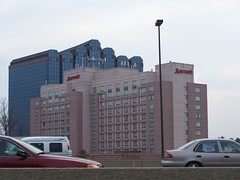 Office building and hotel in the I-270 corridor in Montgomery County, Maryland.
Office building and hotel in the I-270 corridor in Montgomery County, Maryland.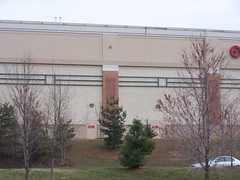
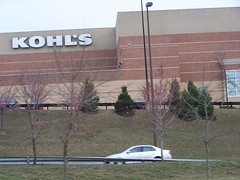 Big box retail in the Washingtonian Center.
Big box retail in the Washingtonian Center.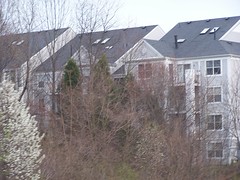 Apartments on Quince Orchard Road, Montgomery County, Maryland.
Apartments on Quince Orchard Road, Montgomery County, Maryland.Real estate development is the primary interest of what Harvey Molotch called "The Growth Machine," in his seminal urban sociology article about local elites, agenda setting, and power relations, "City as a Growth Machine: Toward a Political Economy of Place."
And most of the articles in the WBJ are about this business of real estate development. For some reason, last week's issue really seems to illustrate this.
First, you have this article, "D.C. gets comprehensive about its planning future," about the DC Comprehensive Plan revision process, which more than anything is about land use, and isn't comprehensive enough to be "the business strategy for the city's future" that Maureen McAvoy of the Urban Land Institute is quoted as saying what the purpose of such planning is. (Note: ULI is the major "trade association" for the builder members of "The Growth Machine" along with the International Council of Shopping Centers, although ULI has a fabulous publishing program useful to anybody concerned with urban revitalization.)
To an advocate, the fact that DC's Comprehensive Plan Steering Committee of "citizen members" is stacked with Growth Machine types--developers, lawyers, and other functionaries greasing the wheels of "the exchange value of place," communicates what the land use planning is all about--making money from place. This part of the article lays out that attitude pretty well:
Task force member Maureen Dwyer, a real estate lawyer at Pillsbury Winthrop Shaw Pittman, says she and some colleagues are concerned that current versions of the plan do not provide many opportunities for growth.
The drafts call for concentrating new development on several large sites throughout the city but do not encourage more density along existing commercial corridors and around Metrorail stations and major thoroughfares -- especially in more established, wealthier parts of the city west of 16th Street, she says. "It's very frustrating," Dwyer says. "It's very pro-historic preservation. Even some of the large parcels aren't free."
DC's most fundamental "assets" are "place-based" and centered around architecture, history, and urban design. Steamrolling over the city for new construction makes DC no different than Anywhere USA (see the photos above). Homogenization of the built environment is a dangerous "economic development" strategy for Washington, DC.
Real estate lawyers, paid to make their client's lives easier, successful, and more profitable, aren't necessarily the best stewards of DC's assets or its future. Among other benefits, the WBJ helps you keep tabs on them...
Speaking of the long horizons that real estate developers work under, the subtitle of this article says it all, "A conversation with Kevin Dougherty: When the Orange Line extension finally happens, this developer will already be waiting at the station." From the article:
The condominiums are already being built. The first office building is in the works. All that's missing from the Dulles Station project is, well, the station. But that's of no concern to Kevin Dougherty, founder and managing partner of Crimson Partners, the developer of the 2.7 million-square-foot development rising in Herndon off the Dulles Toll Road. The site is adjacent to a proposed location for one of the Metro stations on the Orange Line extension, which would expand rail service to Dulles International Airport.
Funding and design issues are still being worked out for the Orange Line project, but Dougherty says he's confident it will pull through. Dulles Station, a potential $1.1 billion development, will eventually have 1,100 residential units, 1.5 million square feet of office space and 70,000 square feet of retail space.
"I can't imagine the need for Metro to Dulles can possibly be ignored, especially when the governor was elected on a transportation platform," says Dougherty, who broke into real estate 25 years ago at the Trammell Crow Co. "The airport is crying for it, too. I think we'll see it happen faster than you would normally believe."
Two other articles show specifics of moving forward in Arlington, the article "Pike's coming attractions spur theater, condo acts," about the revitalization of Columbia Pike, or moving backward (no wonder PG County is sometimes called DC's "Ward 9") in Prince George's County, "Proposed 'upzone' fee could kill P.G. developments," about how a new kind of impact fee could militate against mixed use projects--the kinds that Arlington County has in abundance. And the online edition is rounded out by an editorial, "Zoned out" about the PG County proposal. Note that WBJ editorials indicate the thinking of the Growth Machine.
Note that last October, the WBJ had an article, "How will D.C. flip its historical flop? The Federal City Council wants a temporary home for its music museum while others plot longer term," as well as an editorial about the City Museum and how the Federal City Council's Music Museum planning were becoming one. The editorial, "Don't look back: Why history lovers must let the City Museum rest in peace," lays out the agenda:
So the City Museum failed. Time to move on...
It was a nice idea. We applauded the mission of highlighting the real District, its inhabitants and all things not so National Mall-ish. And it was, for the most part, a valiant effort.
But this building is too important.
The Carnegie Library building, which housed the City Museum, sits on a small parcel that could do huge things for local economic development. It's surrounded by billions of dollars in residences, retail and office space under development. The Washington Convention Center sits to the north; the old convention center and its highly touted, billion-dollar future to the west; the revitalized Penn Quarter to the south; and the increasingly active Mount Vernon Triangle neighborhood to the east.
So did you notice this article from the Washington Post earlier in the week--"New Page for Carnegie Library"? The City Museum is no more. From the article:
After years of planning, organizers of a proposed National Music Center announced yesterday that they are moving to the former Carnegie Library and starting performances, classes and exhibitions this spring.
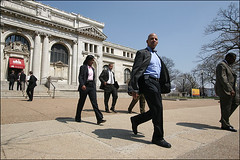 Mayor Anthony A. Williams leaves the former Carnegie Library yesterday after it was announced that the proposed National Music Center will use the building for performances and classes. Photo: James A. Parcell, The Washington Post.
Mayor Anthony A. Williams leaves the former Carnegie Library yesterday after it was announced that the proposed National Music Center will use the building for performances and classes. Photo: James A. Parcell, The Washington Post.If you read the WBJ regularly, you know what to expect--what will happen with key properties in the city and beyond. And, you begin to understand that the Mayor doesn't really run the city as much as the real estate interests do.
The WBJ is complemented by the excellent Bizjournals website, which is a primary source for my learning about projects elsewhere. One can look at other city editions--I have been snowed under and haven't done this much lately but I try to review the papers from Baltimore, Boston, Pittsburgh, Philadelphia, and St. Louis to keep up-to-date on revitalization happenings elsewhere, the Philly edition being particularly good on tourism issues--as well as threaded coverage on such topics as Restaurants, Retailing, and Tourism. And you can set up weekly emails sending you article hits with your own search criteria.
Index Keywords: real-estate-development; growth-machine



0 Comments:
Post a Comment
<< Home